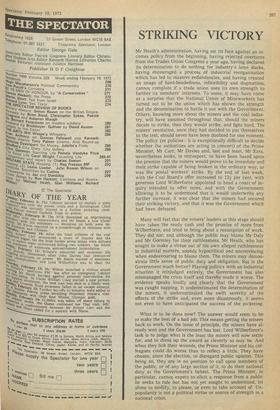STRIKING VICTORY
Mr Heath's administration, having set its face against an incomes policy from the beginning, having rejected overtures from the Trades Union Congress a year ago, having declared its determination to do nothing for industry's lame ducks, having encouraged a process of industrial reorganisation which has led to massive redundancies, and having created an image of hard-headedness, inflexibility and dogmatism, cannot complain if a trade union uses its own strength to further its members' interests. To some, it may have come as a surprise that the National Union of Mineworkers has turned out to be the union which has shown the strength and the determination to battle it out with the Government. Others, knowing more about the miners and the coal industry, will have assumed throughout that, should the miners decide to strike, then they would strike, and fight hard. The miners' resolution, once they had decided to put themselves to the test, should never have been doubted for one moment. The policy (or policies : it is exceptionally difficult to decide whether the authorities are acting in concert) of the Prime Minister, Mr Carr, Mr Davies and, last and least, Mr Ezra. nevertheless looks, in retrospect, to have been based upon the premise that the miners would prove to be irresolute and their strike capable of being broken in the ordinary way, as was the postal workers' strike. By the end of last week, with the Coal Board's offer increased to 121per cent, with generous Lord Wilberforce appointed to head a court of inquiry intended to offer more, and with the Government allowing it to be understood that it would underwrite any further increase, it was clear that the miners had secured their striking victory, and that it was the Government which had been defeated.
Many will feel that the miners' leaders at this stage should have taken the ready cash and the promise of more from Wilberforce, and tried to bring about a resumption of work. They did not; and although the public may blame Mr Daly and Mr Gormley for their ruthlessness, Mr Heath, who has sought to make a virtue out of his own alleged ruthlessness in industrial matters, sounds hypocritical and unconvincing when endeavouring to blame them. The miners may demonstrate little sense of public duty and obligation. But is the Government much better? Playing politics with an industrial situation it misjudged entirely, the Government has also mismanaged the crisis itself and thereby made it worse. The evidence speaks loudly and clearly that the Government was caught napping. It underestimated the determination of the miners, it underestimated the swift severity of the effects of the strike and, even more disastrously, it seems not even to have anticipated the success of the picketing.
What is to be done now? The answer would seem to be to make the best of a bad job. This means getting the miners back to work. On the issue of principle, the miners have already won and the Government has lost. Lord Wilberforce's task is to judge what is the least the miners will now settle for, and to dress up the award as cleverly as may be. And when they lick their wounds, the Prime Minister and his colleagues could do worse than to reflect a little. They have chosen, since the election, to disregard public opinion. This being so, they are in no position to call upon members of the public, or of any large section of it, to do their national duty at the Government's behest. The Prime Minister, in particular, cannot expect to elicit a response from a public he seeks to rule but has not yet sought to understand, let alone to mollify, to please, or even to take account of. Unpopularity is not a political virtue or source of strength in a national crisis.










































 Previous page
Previous page